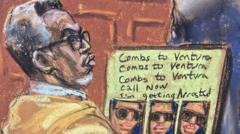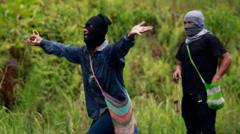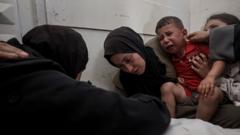On April 13, Ecuador is set to hold a crucial runoff election that poses significant implications for the nation’s fight against rampant drug-related violence.
Ecuador's Presidential Race: A Critical Vote Amidst Drug-Related Violence

Ecuador's Presidential Race: A Critical Vote Amidst Drug-Related Violence
As Ecuador heads into a tense runoff, voters are split over candidates' approaches to escalating crime linked to narcotics.
In a fierce political battleground, Ecuadoreans will cast their votes on Sunday in a runoff election characterized by a deadlock between the incumbent President Daniel Noboa and challenger Luisa González, who’s aligned with former populist leader Rafael Correa. This election comes on the heels of a troubling surge in crime attributed to drug trafficking, which has drastically altered the nation’s landscape over the last five years.
Notably, the country has grappled with high-profile violent incidents, including the assassination of a presidential candidate and violent prison outbreaks that led to multiple deaths. Amidst this backdrop, Noboa is striving for re-election, promoting a hardline security strategy to confront crime, while González offers a contrasting vision representing Correa’s legacy.
The urgency of the election is underscored by Ecuador’s transformation from a relatively peaceful nation into a prominent hub for international drug trafficking. The widening gap in the justice system—marked by rampant corruption, overcrowding, and inadequate resources—has fostered the flourishing of prison gangs that collaborate with global drug cartels, deepening the crisis affecting countless Ecuadoreans.
As voters prepare to make their choice, key issues include strategies for enhancing public safety, addressing underlying societal injustices, and restoring trust in governmental institutions. The immediate challenge is determining which candidate can effectively unify the nation against chaos and offer a viable path toward stabilization. Results of this election are anticipated to have a far-reaching impact on both Ecuador and its role in the international community facing drug-related challenges.
Notably, the country has grappled with high-profile violent incidents, including the assassination of a presidential candidate and violent prison outbreaks that led to multiple deaths. Amidst this backdrop, Noboa is striving for re-election, promoting a hardline security strategy to confront crime, while González offers a contrasting vision representing Correa’s legacy.
The urgency of the election is underscored by Ecuador’s transformation from a relatively peaceful nation into a prominent hub for international drug trafficking. The widening gap in the justice system—marked by rampant corruption, overcrowding, and inadequate resources—has fostered the flourishing of prison gangs that collaborate with global drug cartels, deepening the crisis affecting countless Ecuadoreans.
As voters prepare to make their choice, key issues include strategies for enhancing public safety, addressing underlying societal injustices, and restoring trust in governmental institutions. The immediate challenge is determining which candidate can effectively unify the nation against chaos and offer a viable path toward stabilization. Results of this election are anticipated to have a far-reaching impact on both Ecuador and its role in the international community facing drug-related challenges.




















